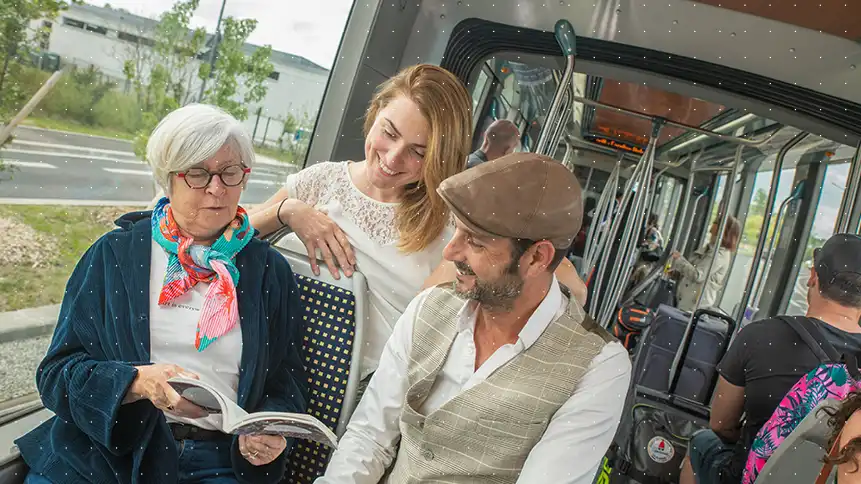At Keolis, the passenger experience lies at the heart of our strategy. The Group is committed to offering individual, accessible and innovative transport services, tailored to the needs of each passenger. Our motto "Thinking like a passenger" and the Keolis Signature Service (KSS) programme embody this commitment. By placing listening and co-construction at the heart of our approach, we aim to create shared, sustainable and people-centric mobility, ensuring smooth, trouble-free travel for all.
The service culture, the Keolis nerve centre
Keolis Signature Service (KSS) is the programme Keolis has been running since 2015 to provide increasingly shared, individualised and people-friendly mobility. Keolis thus places the quality of customer relations and listening at the heart of mobility.
Attention symmetry: engaged employees mean satisfied passengers
"The quality of the relationship between a company and its clients is symmetrical to the quality of the relationship between that company and all its employees". It is upon this philosophy of the Académie du Service that the Keolis Signature Service programme is based.
At Keolis, customer culture is more than just a concept. It is a set of shared values and attitudes that give meaning to the work of its employees, empower them and engage them.
Firmly convinced that a successful customer experience depends on the well-being of its employees, Keolis deploys its KSS approach internally through co-construction. Service gestures are devised as part of participative workshops in response to the concrete expectations of passengers and employees. The ultimate aim is to have fulfilled employees committed to a service culture that delivers a high quality customer service.
Co-constructing efficient mobility solutions
A concrete expression of the Group's motto "Thinking like a passenger", the KSS programme is based on two pillars:
An action identification phase: based on workshops where customers and employees exchange views and identify areas for improvement and the key service actions expected throughout the network.
A phase in which the actions are rolled out using support materials for managers and training modules.
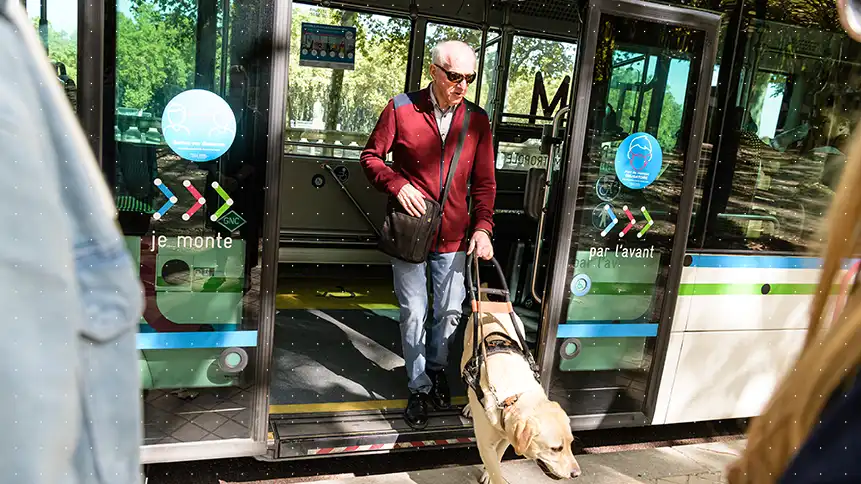
Inclusive, universally accessible mobility
Keolis is committed to sustainable, inclusive mobility that is accessible to all. This commitment is reflected in the Unik approach, which ensures the operational implementation of the Group's accessibility policy and guides the actions developed by the networks for the benefit of their passengers in vulnerable situations.
This approach guides the design, deployment, management and promotion of mobility services geared towards inclusive mobility. The goal is to design increasingly individualised offers and services tailored to the needs of each passenger, whatever their specific requirements.
The pillars of inclusive mobility
The Unik approach is made up of a number of commitments both to our PTA partners and to passengers with special needs. It is based on a common foundation of values shared throughout the Group:
training staff in disability awareness and attentive customer relations ;
structural accessibility of the networks operated by Keolis (vehicles, stops, stations, etc.);
accessibility of passenger information;
service accessibility (digital accessibility, telephone accessibility, etc.);
co-construction with stakeholders and passengers;
innovation in terms of inclusive mobility, etc.
Innovating to make travel easier
Always at the forefront of digital innovation, Keolis is putting technology to work for its passengers. The NaviLens system combines voice guidance, automatic QR code reading and a user-friendly interface to guide visually impaired passengers around stations. Available in 33 languages, it is suitable for use by people experiencing all types of difficulty, along with elderly passengers and tourists.
Invisible disabilities: acknowledging them to provide better support
Universal accessibility is a priority for Keolis. 80% of disabilities are invisible. These disabilities are cognitive, psychological, but also physical. They can be chronic pain and illnesses, DYS disorders, illiteracy, depression or diabetes. But identifying them is difficult.
Keolis is trialling solutions in its subsidiaries to provide better support for passengers with invisible disabilities. In Australia, the Hidden Disabilities Sunflower programme, launched in 2022, involves giving the passengers concerned the option of wearing a lanyard on their wrist. In this way, they can discreetly inform the bus driver that they may need more time to move around, or assistance during their journey.
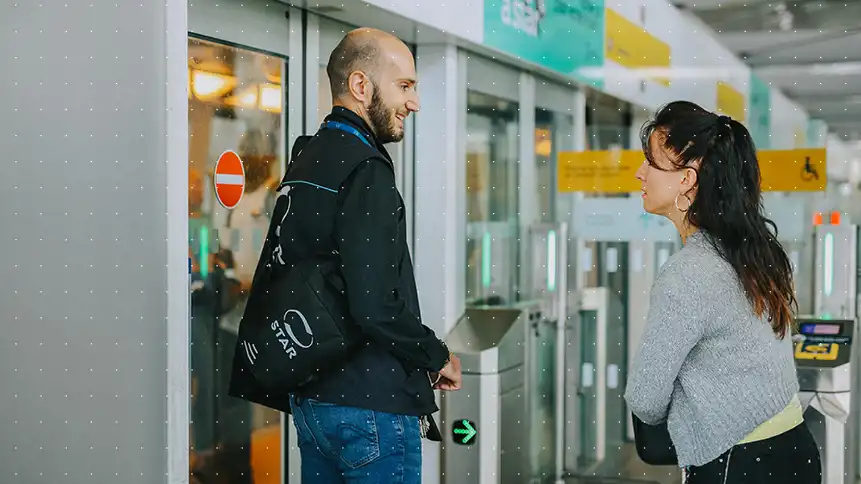
Munti-channel passenger information
To cater for all passengers, Keolis favours a multi-channel approach, combining physical and digital information with human contact: websites, smartphone applications, contact centres, sales offices, network ambassadors, etc.
The Group also makes it easier to get around thanks to clear, carefully designed signage. Coloured arrows, 3D maps, mode compasses, vertical and horizontal thermometers, public address announcements, etc. guide passengers through stations, bus stops and car parks.
Information in real time
Keolis pays particular attention to providing passengers with real-time information, to ensure that their journeys are as trouble-free as possible. Using smartphone applications, passengers can access updated bus times at any moment. In railway and metro stations, timetables are updated according to traffic conditions.
In the event of disruption, ambassadors on the ground are on hand to reassure passengers, keep them updated and, if necessary, suggest alternative transport solutions. Employees are mobilised to circulate rapid, accurate and relevant information, using the various means of communicating with passengers, both on the move and remotely.
Nudges, an innovative passenger information solution
Using "nudges", Keolis offers a passenger information solution that encourages multimodality. Based on behavioural science, this method provides passengers with information and encourages them to adopt a particular behaviour, without ever forcing them to do so.
As part of an experiment in Dijon, nudge signage, made up of coloured arrows and motivational pictograms, encourages modal shift from saturated trams to alternative modes of transport.
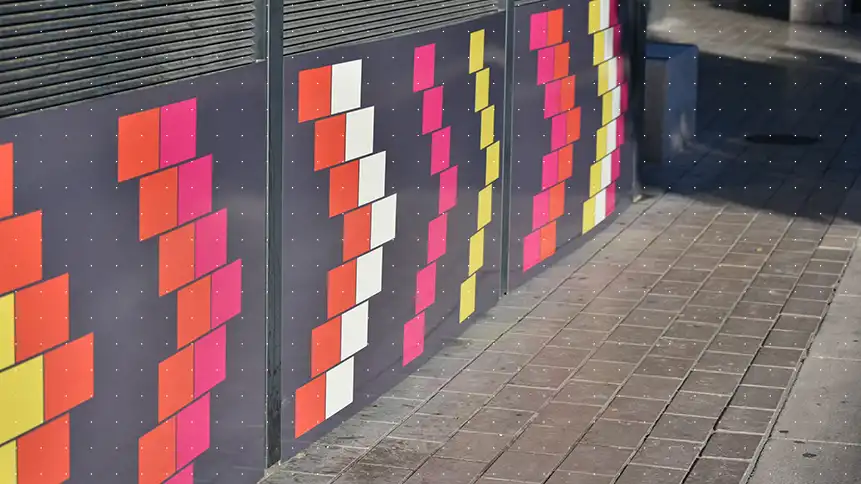

A smooth customer journey
Keolis offers passengers MaaS (Mobility as a Service), a digital service that facilitates the customer journey. Using a single application, passengers can access all the mobility solutions available in their community.
Through a secure interface, they can prepare their journey on their smartphone, check their route and times, pay for and validate their tickets, and monitor traffic in real time, whatever their mode of transport. MaaS is a companion for all journeys, guaranteeing that you choose the best route, know when your bus is due to arrive, or whether a bike-share service is available.
And because not everyone is comfortable with digital technology, advisors are available online and in stations.
Paying more easily with Open Payment
In 2018, in Dijon, Keolis was the first mobility operator to offer Open Payment services in France. Since then, the solution has been rolled out across many of the transport networks operated by the Group.
The idea is to enable passengers to buy and validate their tickets directly on board the bus, tram or metro. Passengers pay contactless using their credit card or the payment card stored on their smartphone.
Open Payment applies the best fare to passengers after the journey, based on their use of public transport over a given period.
“Listening to the voice of the passenger”
Keolis applies an approach consisting of continuously listening to its passengers and employees.
Observe, listen, discuss
Based on listening and co-construction, qualitative and quantitative surveys, customer complaint follow-up and public debates help gain a deeper understanding of the communities served, anticipate lifestyle changes, understand new mobility requirements, and encourage feedback on passenger expectations and complaints.
To do this, Keolis has been drawing on its Keoscopie observatory for fifteen years. A genuine monitoring and foresight tool, Keoscopie pools data from external studies (INSEE, Ipsos, etc.), surveys carried out by Keolis and analysis of ticketing systems and GPS mobile tracks.
Thinking like a passenger
Internally, Keolis runs the "Thinking like a passenger" programme. Divided into concrete commitments and constantly enriched with best practices deployed around the world, it gives each subsidiary the means of designing and running transport networks that are suited to the specific characteristics of each community and meet individual needs.
One of the results of this approach is the introduction of "exploratory walks". These take the form, for example, of walks with groups of women around a city to identify the places where they might feel unsafe, leading to the implementation of tangible actions to remove this obstacle to mobility.
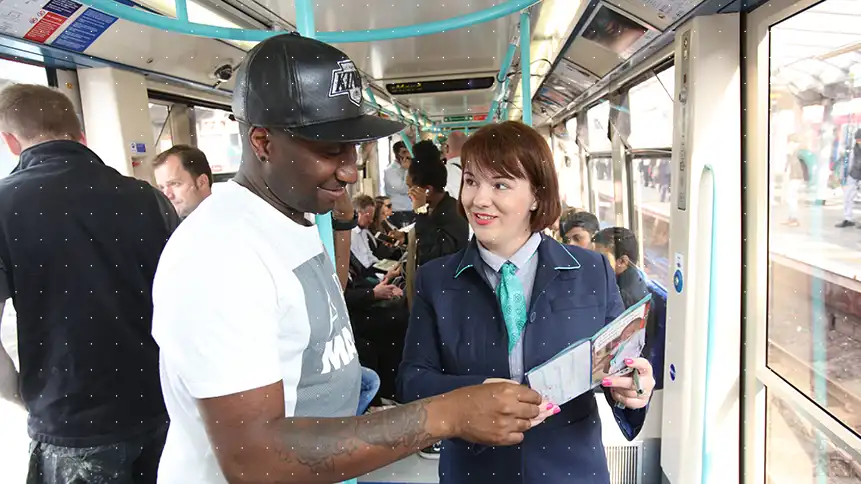
Closer to passengers with crowdsourcing
To go even further in listening to its passengers, in 2022 the subsidiary Keolis Bordeaux Métropole tested the implementation of an online collaborative platform.
The subsidiary engaged with a large audience for the development of its urban transport services, going beyond traditional surveys and the collection of indicators. Transports Bordeaux Métropole succeeded in its aims of connecting withw its passengers, building loyalty and developing pertinent and consistent services.
This collaborative approach was taken up by Keolis in Rennes for the STAR multimodal public transport network. La Fabrique STAR is an online forum where each customer can contribute ideas and suggestions for the network of the future. Nearly 15,000 visits were recorded in just a few months.
